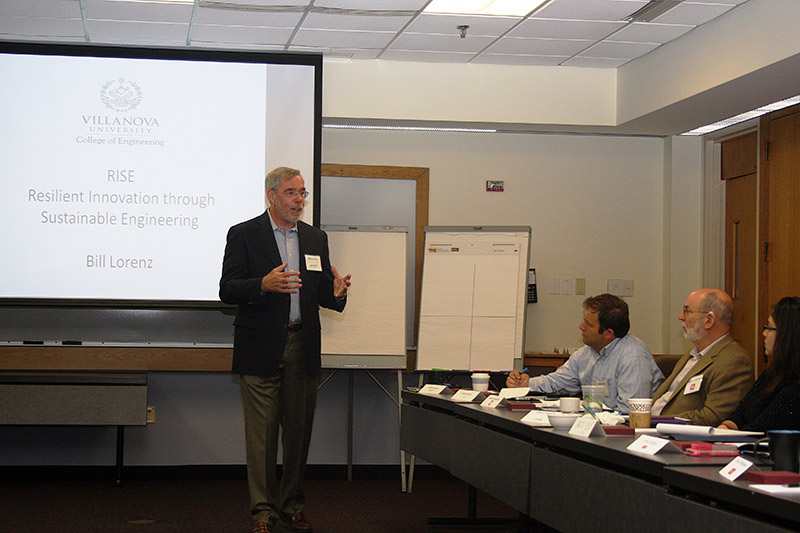Sustainable Engineering Program Presents RISE, a Forum for Industry Leaders

William Lorenz, director of Villanova’s graduate program in Sustainable Engineering, introduces the RISE Forum to industry leaders.
When it launched in January 2010, Villanova’s Master of Science in Sustainable Engineering (MSSE) program was the first of its kind in the nation. Five years on and more than 60 graduates later it remains at the forefront of this increasingly vital field, training engineers and scientists to apply a whole-systems approach to problem-solving through a life-cycle lens. One key to the program’s continued success is its emphasis upon the full spectrum of sustainability issues confronting industry in the 21st century and beyond. This past spring, this explicit focus on corporate sustainability issues and opportunities more formally emerged as the RISE Forum: Resilient Innovation through Sustainable Engineering.
A membership-based network for executives and technical leaders, the RISE Forum is dedicated to advancing the sustainable enterprise through the discipline of engineering. Its mission is to accelerate the identification and application of data-driven solutions that will help its members increase the sustainability of their respective organizations and secure a competitive advantage in the marketplace by reducing costs, managing risk, fueling growth and enhancing reputation. The underlying goal is to use sustainable engineering principles to drive resilient innovation across the value chain.
This initiative will simultaneously strengthen the educational experience of our Sustainable Engineering graduate students. Karl Schmidt, faculty fellow in the Sustainable Engineering program and Director of the RISE Forum, notes: “The RISE Forum provides a unique opportunity for our graduate students to apply sustainable engineering tools and methodologies to ‘real world,’ company-defined problems. While they gain valuable experience in ‘operationalizing the concepts’ learned in the classroom, Forum members benefit from the integrated, whole systems perspective the student teams bring to their respective sustainability challenges. It’s a true ‘win-win’ situation for students and member companies.”
The primary means for facilitating these ‘win-win’ collaborations is through the RISE Forum’s Sustainable Engineering Studies. Working alongside faculty and industry representatives, MSSE graduate students employ STEEP (Social, Technological, Environmental, Economic & Political) Model integrators to fully assess the life cycle impacts of a given project, process or product. These studies augment the academic content of the MSSE Program’s core courses and address the real world business needs of member companies, striking an ideal balance between theory and application. Ultimately, the idea is to spur industry’s adoption of sustainable innovations by providing business leaders with empirical evidence for pursuing a given process, product or technology. The graduate students gain invaluable real world experience through these studies and are uniquely positioned to assume leadership and technical positions. As such, RISE members will have access to a dynamic talent pipeline of future sustainable engineers.
Event Introduces Industry Leaders to RISE
On May 20th, the College formally introduced the RISE Forum concept to the corporate community. Sustainability leaders representing nine companies—Aramark, Boeing, Campbell’s Soup, Comcast, DuPont, Interface, Raytheon and Turner Construction—attended the Forum’s inaugural semiannual meeting at the Villanova Conference Center. Potential members were intentionally recruited from different sectors of the economy so that RISE could leverage the diverse talents and experiences of each company’s leaders, while at the same time creating a non-competitive space for cross-sector information sharing, networking and collaboration. Kevin Eckerle, PhD, from Accenture Strategy, served as the keynote speaker and his presentation, “From Waste to Wealth: Creating Advantage in a Circular Economy,” highlighted five business models and ten technologies that can uncouple economic growth from resource consumption, enabling companies and consumer to “do more with less.” Tim Riordan (ME ’86), VP for Supply Chain and Chief Procurement Officer of Interface, Inc., described how his firm is pursuing circular economy concepts through the company’s NetWorks initiative in Southeast Asia, which links the recovery and recycling of waste fishing nets with socio-economic gains for low income populations.
The highlight of the meeting were the graduate student presentations of recently completed Sustainable Engineering Studies. The presentations not only reinforced the technical rigor that engineers bring to the topic, but the diversity of sustainability issues our graduates are prepared to address. The four presentations described: (1) the development of gender equity metrics for use in a cocoa supply chain; (2) the use of the STEEP Model to inform transportation infrastructure decision-making; (3) the use of a comprehensive lifecycle assessment to quantify the impacts of various soil remediation technologies; and (4) how biomimetic design principles, namely, replicating the heat storage properties of dolphin blubber, can improve waste heat recovery within power plants.
The RISE Forum is a natural evolution for the founders of Villanova’s graduate program in Sustainable Engineering. In addition to Lorenz, retired co-founder of Environmental Resource Management, the world’s leading sustainability consultancy, RISE is led by Karl Schmidt, retired vice president of Johnson & Johnson, who directed the company’s Global Supply Chain Risk Management program and developed its first sustainability program; and Ross Lee, a retired senior scientist from DuPont with seminal contributions to the fields of sustainable chemistry and materials. These industry experts look forward to applying more than 100 years of combined private sector experience to developing the RISE Forum, just as they built a truly novel and innovative graduate program in sustainable engineering.
